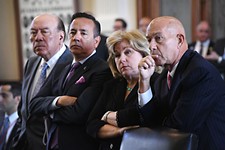House: Squeeze the (Dem) Voters
Voter-ID bill passes the House
By Lee Nichols, Fri., April 27, 2007
Republicans claim the voter-ID bill is needed to preserve the integrity of the ballot. Lead author Betty Brown, R-Athens, raised the specter of mobs of noncitizens and dead people heading to the polls and tipping elections. Her evidence that this might be a problem was pretty slim: testimony by the Harris Co. voter registrar that he had identified "at least" 35 foreign nationals who either applied for or received voter-registration cards and that one Brazilian woman registered and voted "at least" four times – in a county with almost 2 million registered voters. Of that handful of examples, of course, none was an actual attempt at the voter-impersonation crime that the bill purports to address.
And that, said the bill's opponents, pulls the mask off Republicans' real intentions. HB 218 is simply a solution in search of a problem, they say; it will actually discourage voting by groups less likely to have forms of photo ID – minorities, the poor, and seniors – and in those groups are a lot of potential Democratic votes. "Let's be clear about this: There is no voter-impersonation problem or voter-fraud epidemic in this state as the authors of this legislation are misleading us to believe," said Roberto Alonzo, D-Dallas. "This is part of a much larger problem – their partisan disenfranchisement effort to keep seniors and minorities from voting."
The floor fight was led by Democrat Rafael Anchía, also of Dallas. He claimed that Brown's Brazilian woman actually presented photo ID when she voted, so the bill would have had no effect. He demanded Brown present evidence of hordes of dead voters, and she held up a thick stack of papers; Anchía said he had reviewed the same papers and said they bore no such evidence. A major Dem attack was to paint the bill as a poll tax, since photo IDs usually require a fee of some sort. Brown accepted an amendment by Dallas' Yvonne Davis to waive such fees if the person is applying for an ID solely to vote.
Dems also pointed out the ease with which one can obtain fake IDs – any beer-seeking frat boy can tell you where to buy one. Workplace IDs are also acceptable under the bill. "No matter how much training you do with poll workers, no matter how much training you do of election judges and election officials, it will be impossible for them to discern what is a valid employment identification and what is an invalid employment identification," Anchía said.
Thirty amendments were thrown at HB 218 as Democrats desperately tried to ameliorate the worst effects, but the only 13 that stuck were those that Brown accepted, included waiving the ID requirement for people over 80, victims of weather disasters, and war veterans and their widows. The bill passed 76-68 with Democrats united against it; Lubbock's Delwin Jones and Longview's Tommy Merritt were the only Republicans to vote nay. After 61Ú2 hours of bitter debate, a similar bill – which would require photo ID to register to vote – was mercifully postponed until this Monday.
"Racism is racism; xenophobia is xenophobia," said Fort Worth's Lon Burnam in closing. "It's too bad that we're going to see it enacted on the House floor again."
It's uncertain whether HB 218 can survive the Senate – Houston's Rodney Ellis says he has united all 11 Democrats against voter-ID bills. If that bloc holds, it would be enough to keep the bill from ever reaching the Senate floor, unless it arrives as an amendment to another election-related bill.
Got something to say on the subject? Send a letter to the editor.








